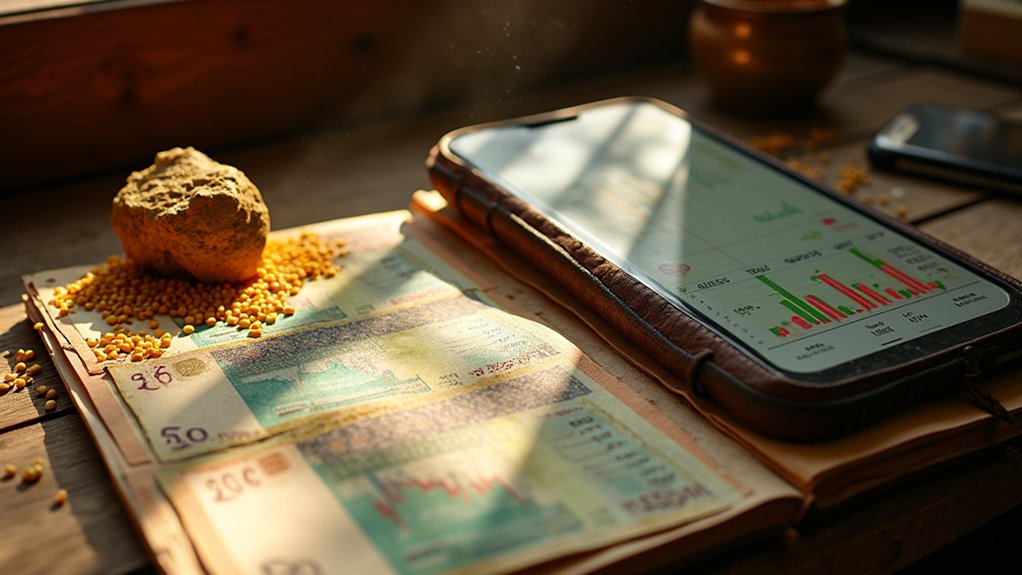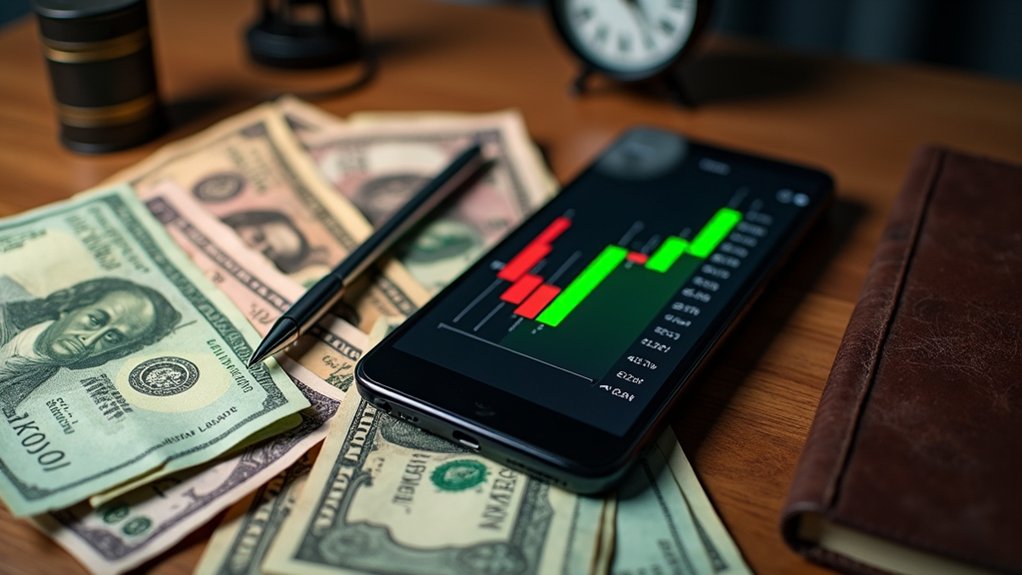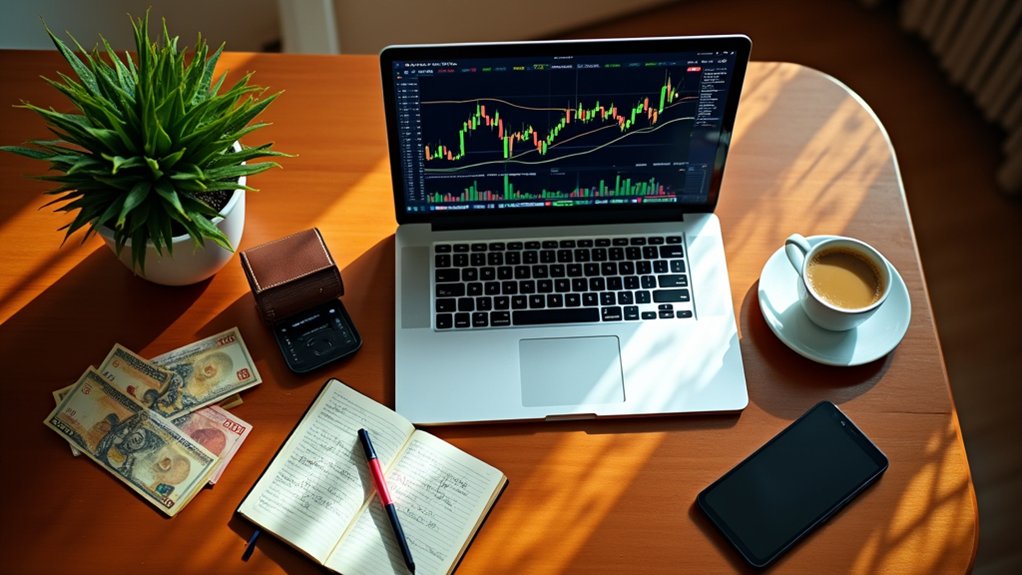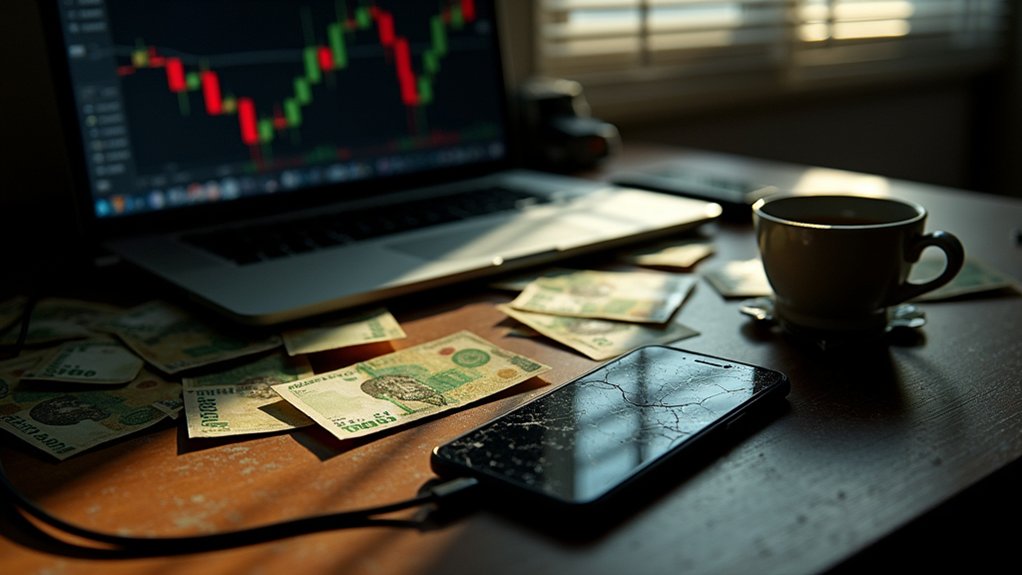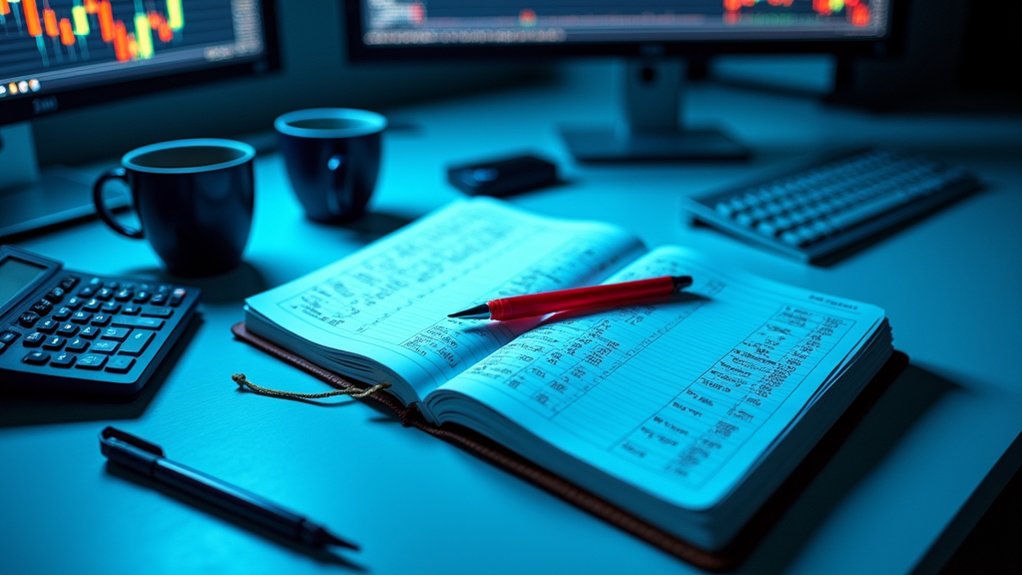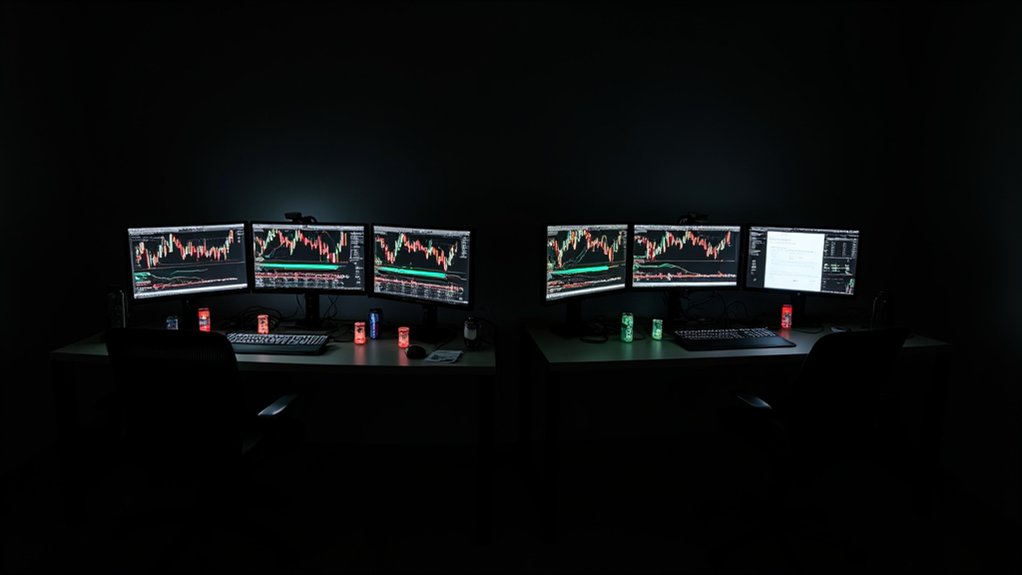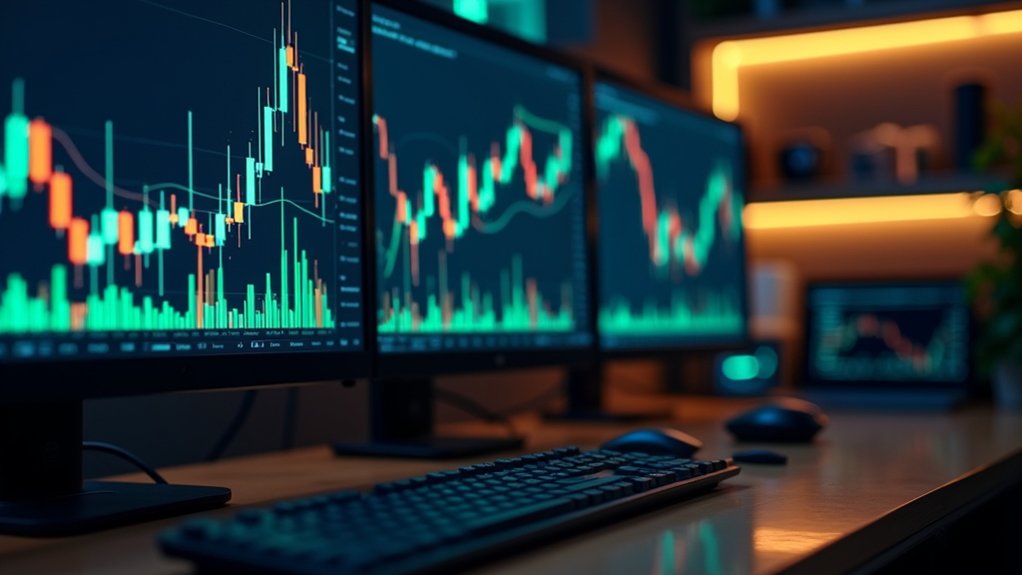Forex trading in Mali sits in a legal gray zone—not explicitly banned, but hardly blessed with clear rules either. The BCEAO oversees currency policy across the region, yet no regulator actively watches retail traders opening MetaTrader accounts through foreign brokers found on WhatsApp. Most of Mali's 19 million people are under twenty-five, many are curious about online trading, and infrastructure remains patchy: cash dominates, mobile money is rising, and scammers thrive in the vacuum left by absent oversight. The details below reveal how traders actually fund accounts, when liquidity peaks, and which fraud tactics to dodge.
Quick Facts That Matter
- Forex trading exists in a legal gray zone with no dedicated national regulator; traders rely on foreign-licensed brokers for access.
- Regional oversight by BCEAO and WAEMU bodies focuses on banks, leaving retail forex platforms largely unmonitored and unprotected.
- Payment friction is high: SEPA transfers are inaccessible, cash dominates, and mobile money is rising among Mali's largely unbanked population.
- Scammers exploit regulatory gaps via WhatsApp, Telegram, and social media, using fake brokers, signal sellers, and Ponzi schemes.
- Prime trading window is 2:00–5:00 PM Mali time during London–New York overlap, when spreads tighten and liquidity peaks.
Overview: Forex Trading in Mali
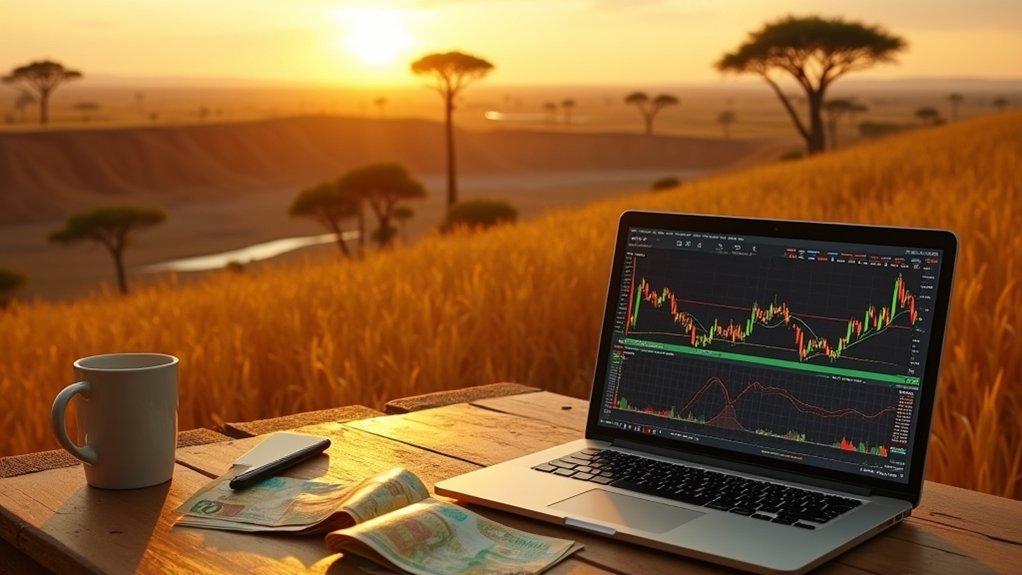
While most traders obsess over London and New York, Mali sits quietly in West Africa as an emerging frontier market that barely registers on the typical retail trader's radar. This nation of 19.1 million people—67% under age 25—represents untapped potential. Young traders are flooding in. Millennials and Gen Y types building wealth online.
The landscape? Raw. Agricultural exports move the needle on currency values. Mining sector shifts ripple through economic indicators. Political stability matters here more than fancy algorithms. The Malian Franc (XOF) dances to its own rhythm, hitting 913.00 against USD in November 2024. West African location creates opportunities most traders ignore completely. The CFA Franc is used across multiple West and Central African nations, creating unique trading dynamics in forex markets. Central bank decisions directly shift currency valuations overnight.
Is Forex Trading Legal in Mali?

Forex trading exists in a legal gray zone in Mali, but retail traders can technically participate—provided they navigate a tangled web of West African regulations.
Mali's forex market operates in regulatory limbo—legal on paper but wrapped in bureaucratic complexity that challenges even experienced traders.
The BCEAO oversees foreign exchange rules. UEMOA Regulation N° 09/2010/CM/UEMOA applies too. Only authorized financial institutions can handle forex transactions legally.
That's the catch. Retail traders must find brokers regulated by heavyweight authorities—FCA, ASIC, CFTC, BaFin. Platforms like Fusion Markets and Capital.com tick those boxes.
Local taxation rules still apply, obviously. Nobody's exempt.
Trading isn't technically illegal, but compliance demands feel like threading a needle while blindfolded. Understanding regulatory standards across multiple jurisdictions becomes essential when choosing a broker. Mali's population of roughly 19.66 million represents a substantial pool of potential retail traders seeking access to forex markets.
Mali's broader investment landscape saw significant regulatory tightening with the 2023 Mining Code adopted, which abolished certain tax exemptions and increased state control over foreign activities in strategic sectors.
Who Regulates Forex Trading in Mali?

Mali doesn't have its own forex watchdog—period.
Instead, oversight falls to the Banking Commission of the West African Monetary Union (CB-UMOA), which monitors banks, not retail forex brokers.
The Financial Markets Authority (AMF-UMOA) theoretically supervises markets across eight WAEMU countries, but forex trading? That's murky.
There's no dedicated body tracking MetaTrader accounts or leverage caps.
Foreign brokers—licensed by ASIC, FCA, or CySEC—operate freely.
Mali's regulatory framework is regional, not national.
It's a patchwork.
Traders effectively rely on international regulators thousands of miles away.
Not exactly reassuring for a beginner in Bamako.
Compare this to Egypt, where the Financial Regulatory Authority actively oversees forex trading activities within its borders.
In Spain, deposit protection falls under the Instituto de Garantía de Depósito, though Mali has no equivalent safeguard for forex accounts.
How Forex Trading Works in Mali

How does a trader in Bamako actually get started? Pick a regulated broker that accepts Mali traders. Fill out the registration form. Upload a passport or NINA card, plus an EDM bill for address proof. Wait for approval. Fund the account—bank transfer works, cards too, even mobile banking. Download MT4. Log in. Start trading currency pairs. That's it.
No magic. The mechanics are straightforward, though 67% of the population is under 25, which explains the growing influx of younger traders testing their luck. Legal? Yes. Easy? Debatable. Profitable? That's another story entirely. Most brokers offer demo accounts for practice before risking real capital. Compare trading platforms and account features carefully before committing to any single provider.
Best Time to Trade from Mali

Opening an account matters little if a trader picks the wrong hours to stare at charts.
Mali sits squarely in the GMT zone, which means London's 8:00 AM to 5:00 PM session aligns perfectly with local business hours. The Tokyo session demands 1:00 AM wake-ups—brutal for most. Sydney runs 10:00 PM through 7:00 AM, equally punishing. New York opens at 2:00 PM and closes at 11:00 PM. The golden window? That London-New York overlap from 2:00 PM to 5:00 PM Mali Time, when liquidity peaks and spreads tighten. Different currency pairs show distinct activity patterns depending on which trading sessions their underlying economies participate in most heavily.
Weekend markets close Friday night. Calm and slow markets can waste trading efforts, so timing matters as much as strategy.
Payments, Deposits and Withdrawals in Mali
Every forex trader in Mali hits the same wall: how to actually move money into and out of a brokerage account when most platforms sit in Europe or Cyprus and expect SEPA transfers or Visa cards.
Moving money into European brokerage accounts from Mali means navigating a system built for SEPA transfers nobody here can access.
Cash still dominates, but counterfeit risk makes brokers nervous.
Bank cards work—when they work.
Western Union and MoneyGram offer workarounds.
Mobile money is exploding because only 20% of adults touch traditional banks.
WorldRemit, Xoom, and MoneyGram now push CFA francs to Malian accounts within a day.
Initial deposits run CFA 25,000 to 100,000.
Documentation? Residence proof, ID, maybe payroll stubs. It's thorough.
Timing matters too: forex market volatility swings dramatically depending on which global session is active, so understanding when liquidity peaks can help Malian traders plan deposits around their most active trading windows.
Taxes, Reporting and Money Rules in Mali
Trading profits sound great until the tax man knocks. But here's the problem: nobody seems to know the exact rules for forex traders in Mali.
The search results? Empty on specifics. Tax rates? Unclear. Reporting deadlines? Not mentioned. Currency controls? Maybe, maybe not.
The Ministry of Economy and Finance might have answers. So could the BCEAO. But solid, publicly available documentation on Mali's forex tax obligations, mandatory filings, and anti-money laundering requirements for retail traders remains frustratingly elusive.
Part of the confusion stems from how governments use capital controls to regulate currency flows, yet Mali's specific implementation for retail forex traders remains undocumented in accessible public sources.
Good luck finding clarity. Traders are effectively flying blind on compliance.
Forex Trading Scams and Risks in Mali
Scammers love frontier markets, and Mali fits the bill perfectly. Fake brokers set up slick websites, collect deposits, then vanish.
Signal sellers flood WhatsApp and Telegram promising “guaranteed” trades—spoiler: they're worthless. Ponzi schemes disguise themselves as forex investment clubs, paying early birds with new money until the whole thing collapses.
Social media amplifies everything; roughly 32% of forex fraud now spreads via Facebook, TikTok, and Instagram. Account takeovers happen when traders use sketchy platforms with zero security.
Mali's limited regulatory oversight makes it easier for con artists to operate unchecked. Trust nobody promising easy forex riches.
Quick Q and A
Can I Trade Forex in Mali Using a Mobile Phone Only?
Yes, retail forex traders in Mali can trade exclusively via mobile phone using broker apps from regulated platforms like MT4, MT5, or proprietary applications offered by brokers such as XTB, Pepperstone, and IC Markets, provided stable internet access exists.
Do International Brokers Accept Traders From Mali Without Restrictions?
Multiple international brokers accept Mali traders without geographic restrictions in 2025, including Fusion Markets, Pepperstone, IC Markets, eToro, and Interactive Brokers. These platforms permit account registration, deposits, and trading access for Mali-based retail forex participants.
What Is the Minimum Deposit to Start Forex Trading in Mali?
Several international brokers accept Mali traders with zero minimum deposit requirements, including Interactive Brokers, Pepperstone, and CMC Markets. Ultra-low options start from $5 (OANDA) and $10 (eToro), providing accessible entry points for beginners.
Are There Local Forex Trading Communities or Mentors in Mali?
Information about organized forex trading communities or formal mentorship networks in Mali remains limited. While trading activity has increased among young Malians, documented data on established local communities, trading groups, or structured mentorship programs is currently unavailable.
Can I Use West African CFA Francs Directly for Deposits?
Most international forex brokers do not accept XOF deposits directly. Traders typically convert CFA francs to USD or EUR through local banks before funding accounts, as brokers primarily operate with major currencies for deposit processing.
The Bottom Line
Trading forex from Mali is possible but messy. Accounts open, money moves—slowly—and platforms load when the internet cooperates. Regulation is a gray zone, scams lurk, and taxes exist even if enforcement doesn't always follow through. Infrastructure makes everything harder than it needs to be. A handful of traders push through anyway, armed with VPNs, mobile money, and patience. It's not illegal, just inconvenient. For most, the friction outweighs the appeal.
